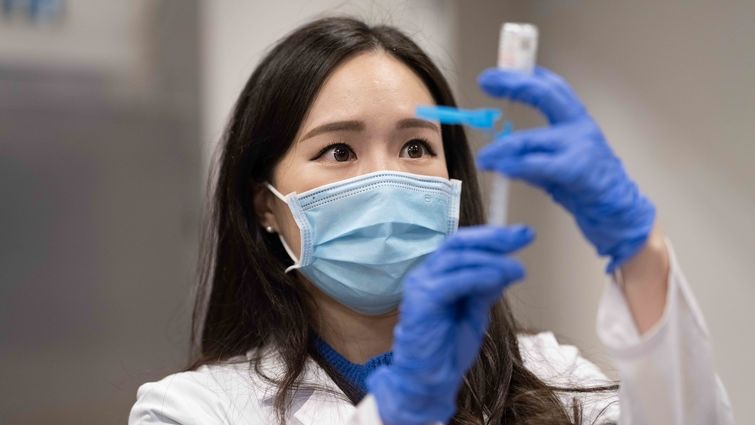
LLU health worker prepares to inject a dose of the COVID-19 mRNA vaccine.
The U.S. Food and Drug Administration announced emergency authorizations for moderately to severely immunocompromised people to receive an additional dose of an mRNA COVID-19 vaccine — the Pfizer-BioNTech COVID-19 vaccine or the Moderna COVID-19 vaccine — after two initial doses. Passed last week, the authorization grants those with compromised immune systems eligibility to receive a third vaccine dose and ensure adequate protection against COVID-19.
Jonathan Arcobello, MD, assistant professor at Loma Linda University School of Medicine and director of transplant infectious disease, answers top questions about the newly approved measure.
Who is eligible to receive a third dose of the mRNA vaccine?
You are eligible for an additional dose of the mRNA vaccine if you:
- have already received two doses of the mRNA vaccine, and
- are moderately to severely immunocompromised from a medical condition or from taking immunosuppressant medications.
A complete, detailed list of criteria for eligibility is available from the Centers for Disease Control and Prevention.
Why have the FDA and CDC authorized the third dose for some immunocompromised people?
Recent and ongoing studies show that some immunocompromised people have decreased immune responses to the mRNA vaccine series compared to immune responses of their non-immunocompromised counterparts. Research and experience also tell us immunocompromised patients face a higher risk of feeling severe COVID-19 symptoms and being hospitalized after contracting the disease.
The authorization of a third dose for the subset of patients aims to help them develop a more robust immune response to the vaccine and prevent them from developing severe disease.
It is important to note that this third COVID-19 vaccine is not a booster dose — an additional shot designed to "boost" immunity after it waned from the previous vaccine dose. In this case, the COVID-19 vaccines have not "worn off" to warrant a third dose. Instead, the third dose will help better protect immunocompromised patients who did not mount as strong of a response to the standard double dose of the mRNA vaccine compared to non-immunocompromised patients.
Should I get the third shot if I fit into this category of immunocompromised individuals?
Yes. A double-blinded placebo-controlled trial published last week revealed immunocompromised transplant patients showed enhanced immune responses after receiving a third dose of the Moderna vaccine, without any significant increases in side effects or organ rejections.
The healthcare community continues to evaluate the safety, efficacy, and benefit of additional doses of the COVID-19 vaccine in immunocompromised people. None of the outcomes from the studies released so far preclude us from offering the third dose of mRNA to patients needing to build a more robust immune response. The potential for clinical benefits — enhanced immunity — outweigh the risks for immunocompromised patients getting a third dose.
What are the next steps to obtaining a third dose of the vaccine if I am eligible?
Wait at least four weeks after the second dose, and then obtain your third dose. Try to get the same series of the mRNA vaccine you started with; if you got two doses of Pfizer, get a third Pfizer dose. Same for Moderna. However, if you cannot obtain the third dose from the same series, you may receive the other mRNA vaccine.
You should delay your vaccine dose at least 90 days if you received either monoclonal antibodies or convalescent plasma as a treatment for a COVID-19 infection after your second dose. This is because following those treatments with a vaccine dose too soon may interfere with your body’s ability to develop immunity to the vaccine.
To obtain your third dose, you may
- Speak with your primary care provider to confirm eligibility or raise any concerns or questions, and/or
- Visit your local pharmacy or vaccine distribution center. Be prepared to express your eligibility for a third dose.
Loma Linda University Health offers COVID-19 vaccinations. For more coronavirus information, visit lluh.org/coronavirus.
